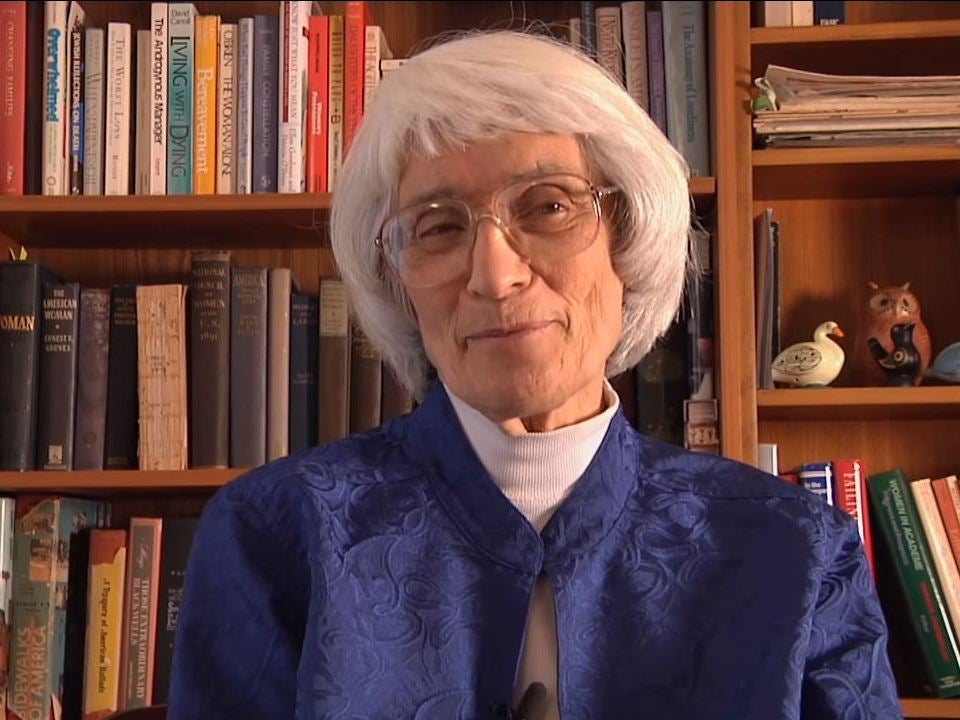Bernice Sandler: Women’s rights champion behind landmark sex discrimination law in the US
Unable to win a teaching post after gaining her PhD in the Sixties, her campaigning changed the employment prospects of generations of women

Your support helps us to tell the story
From reproductive rights to climate change to Big Tech, The Independent is on the ground when the story is developing. Whether it's investigating the financials of Elon Musk's pro-Trump PAC or producing our latest documentary, 'The A Word', which shines a light on the American women fighting for reproductive rights, we know how important it is to parse out the facts from the messaging.
At such a critical moment in US history, we need reporters on the ground. Your donation allows us to keep sending journalists to speak to both sides of the story.
The Independent is trusted by Americans across the entire political spectrum. And unlike many other quality news outlets, we choose not to lock Americans out of our reporting and analysis with paywalls. We believe quality journalism should be available to everyone, paid for by those who can afford it.
Your support makes all the difference.“Let’s face it, you come on too strong for a woman,” Bernice Sandler was told in 1969 when she was applying for a teaching position, doctorate in hand.
Sandler, who has died aged 90, had run headfirst into a problem that had only recently been given a name: sex discrimination.
Knowing she was not alone, she embarked on a campaign that would change the campus culture in America – and eventually the law. In 1972 the US passed the landmark amendment known as “Title IX” banning sex discrimination in government-funded education centres.
Trained in psychology and counselling, Sandler devoted decades of her life to identifying and fighting sexism faced by women in the workplace.
University departments arbitrarily limited the number of women they would hire. Others hired no women at all. Some disqualified married women or barred female students from chemistry and other subjects deemed more suited for men.
This was all legal. Then Sandler found that an executive order signed by President Lyndon Johnson prohibited sex discrimination by organisations with federal contracts.
“It was a genuine ‘eureka’ moment,” she later recalled in an account of her work. “I actually shrieked aloud for I immediately realised that many universities and colleges had federal contracts, were therefore subject to the sex discrimination provisions of the executive order.”
Sandler joined the Women’s Equity Action League and took 250 academic centres to task over alleged sex discrimination. She also coordinated a letter-writing campaign that, by her account, “generated so much congressional mail that the departments of labour, and health, education and welfare had to assign several full-time personnel to handle the letters.”
In 2013 she was inducted into America’s National Women’s Hall of Fame.
For decades after Title IX was passed, Sandler continued her activism for gender equality in the classroom.
Female professors, she found, were more likely than male professors to be challenged on their credentials. Those with PhDs were not consistently addressed as “Dr” and students expected greater leniency from women when they failed to complete their assignments.
Female students, for their part, were more likely to receive an “uh-huh” from a professor when they participated in class, rather than the more engaged response that might greet a male student.
“When Title IX was passed, I was quite naive,” Sandler said. “I thought all the problems of sex discrimination in education would be solved in one or two years at most. When two years passed, I increased my estimate to five years, then later to 10, then to 50, and now I realise it will take many generations to solve all the problems.”
Bernice Resnick – who went by the nickname Bunny – was born in New York in 1928. Her parents ran a women’s clothing store in New Jersey.
Sexist practices, she recalled, seemed to be part of the natural order of the world. “When I applied to college, it was openly known that women needed higher grades and test scores in order to be accepted,” she recalled in a history of Title IX. “No one complained – it was just the way things were.”
She received a bachelor’s degree from Brooklyn College in 1948 and a master’s degree from City College of New York in 1950, both in psychology, and a PhD in counselling from the University of Maryland in 1969.
Sandler spent two decades as the director of the Project on the Status and Education of Women at the Association of American Colleges until she stepped down in 1991. She later held associations with institutions including the Centre for Women Policy Studies in Washington and was a sought-after witness in discrimination and sexual harassment cases. As an activist, she also highlighted the danger of rape on campuses.
Sandler’s marriage to Jerrold Sandler ended in divorce. Survivors include two daughters and three grandchildren.
Bernice Sandler, American women’s rights activist, born 3 March 1928, died 5 January 2018
© Washington Post
Join our commenting forum
Join thought-provoking conversations, follow other Independent readers and see their replies
Comments